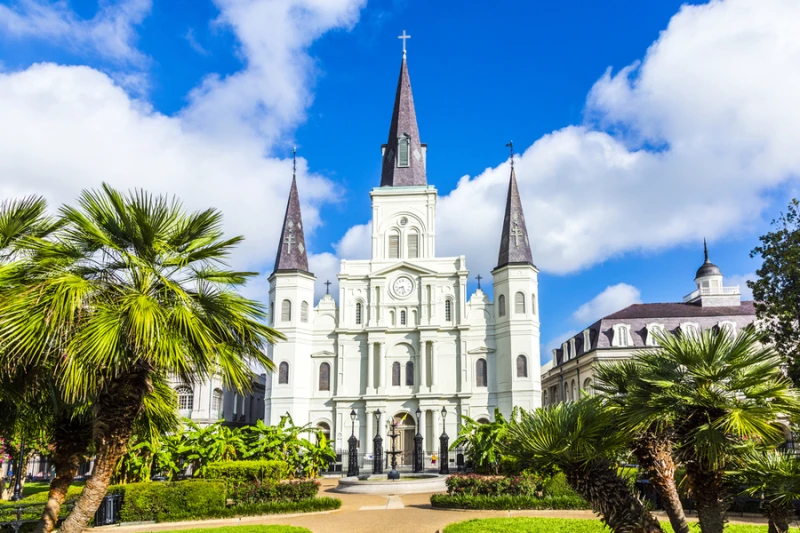
CNA Staff, Sep 9, 2025 / 14:53 pm (CNA).
After the Archdiocese of New Orleans increased its settlement offer to clergy sexual abuse claimants from $180 million to $230 million on Sept. 8, attorneys of the victims urged their clients to accept the deal.
The archdiocese was able to increase its initial offer, announced in May, after securing a buyer for the $50 million sale of Christopher Homes, a property that has provided affordable housing and assisted living to low-income and senior citizens in the Gulf Coast area for the last 50 years.
“We knew we could do better, and we have,” said attorneys Richard Trahant, Soren Gisleson, John Denenea, and several other attorneys who represent about 200 of the 660 claimants.
The attorneys, who said the initial settlement was “dead on arrival,” urged their clients to hold out for a better offer, saying that they deserved closer to $300 million, a figure similar to the $323 million paid out to about 600 claimants by the Diocese of Rockville Centre in New York in 2024.
In the Diocese of Rockville Centre bankruptcy settlement, attorneys reportedly collected about 30% of the $323 million, or approximately $96.9 million. Similarly, the Los Angeles Archdiocese’s $660 million settlement in 2007 saw attorneys receiving an estimated $165-$217.8 million, or 25%-33% of the payout.
Payout amounts to individual claimants in the New Orleans case will be determined by a point system negotiated by a committee of victims.
Administered by a trustee and an independent claims administrator appointed by the court, the point system is based on the type and nature of the alleged abuse. Additional points can be awarded for factors like participation in criminal prosecutions, pre-bankruptcy lawsuits, or leadership in victim efforts, while points may be reduced if the claimant was over 18 and consented to the contact. The impact of the alleged abuse on the victim’s behavior, academic achievement, mental health, faith, and family relationships can also adjust the score.
The settlement offer follows five years of negotiations in the U.S. Bankruptcy Court for the Eastern District of Louisiana, where the nation’s second-oldest Catholic archdiocese filed for bankruptcy in May 2020.
New Orleans Archbishop Gregory Aymond said in a statement Monday that he is “very hopeful and committed to bringing this bankruptcy to a conclusion that benefits the survivors of abuse,” he said.
“I know there remains much work to be done, and I continue to hold this work in prayer. Please know that I pray for the survivors of abuse every day and look forward to the opportunity to meet with them to hear their stories firsthand.”
Two-thirds of the victims in the lawsuit will have to accept the offer by Oct. 29. If they do not, the case could be thrown out of bankruptcy, giving alleged victims a chance to pursue lawsuits individually.
A New Orleans man who filed a lawsuit in 2021 against a Catholic religious order unrelated to the New Orleans bankruptcy case recently won a $2.4 million jury verdict.
In 2021, the Louisiana Legislature eliminated the statute of limitations for civil actions related to the sexual abuse of minors. The new law allows victims to pursue civil damages indefinitely for abuse occurring on or after June 14, 1992, or where the victim was a minor as of June 14, 2021, with a three-year filing window (which ended June 14, 2024) for older cases.
The Diocese of Lafayette, along with the Archdiocese of New Orleans, the Diocese of Baton Rouge, the Diocese of Houma-Thibodaux, Catholic Charities, the Diocese of Lake Charles, and several other entities challenged the law’s constitutionality, arguing it violated due process, but the Louisiana Supreme Court upheld it in June 2024 in a 4-3 decision.
Critics argued the retroactive nature of the law risks unfairness to defendants unable to defend against decades-old abuse claims due to lost evidence and highlighted the potentially devastating financial impact.
If you value the news and views Catholic World Report provides, please consider donating to support our efforts. Your contribution will help us continue to make CWR available to all readers worldwide for free, without a subscription. Thank you for your generosity!
Click here for more information on donating to CWR. Click here to sign up for our newsletter.














